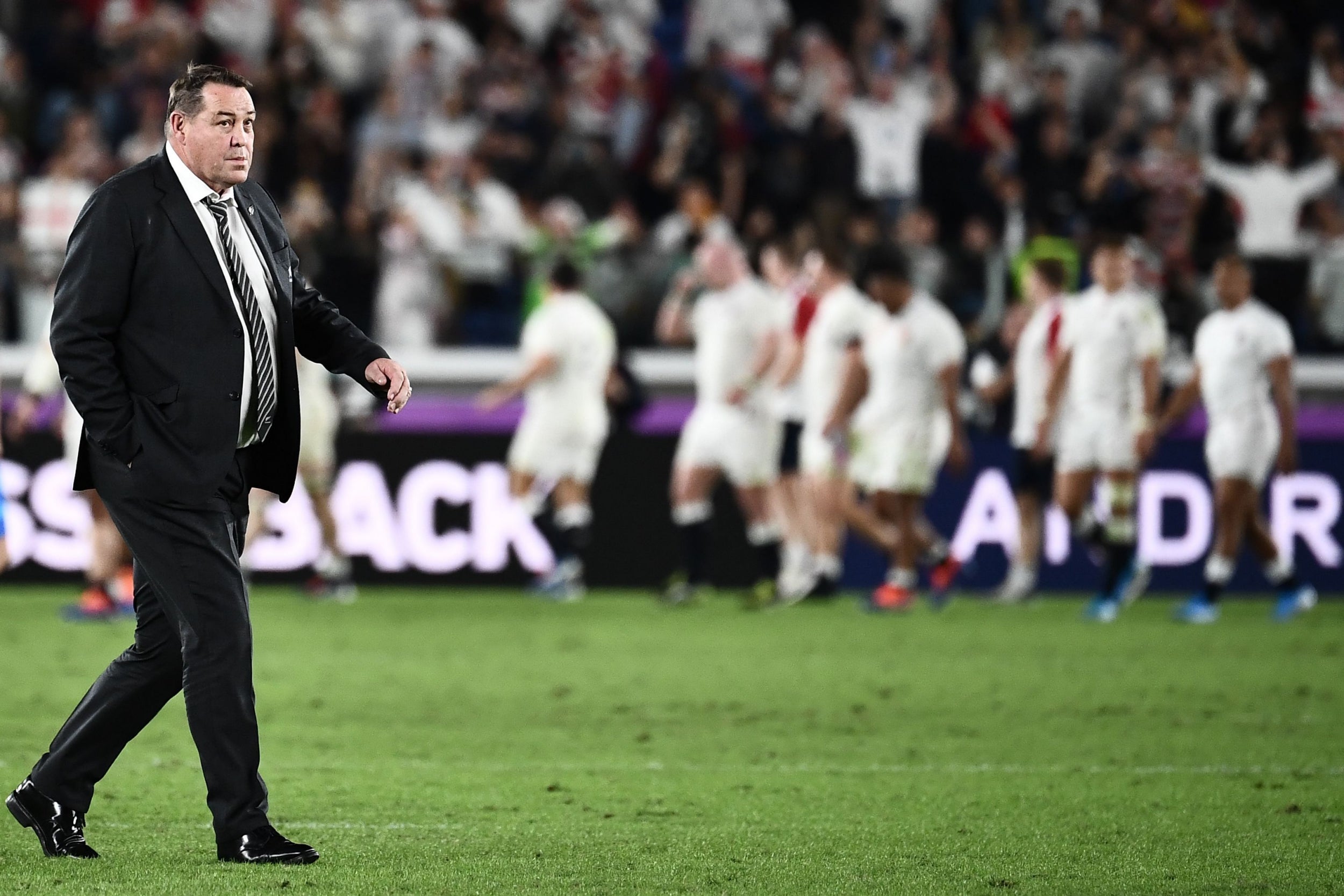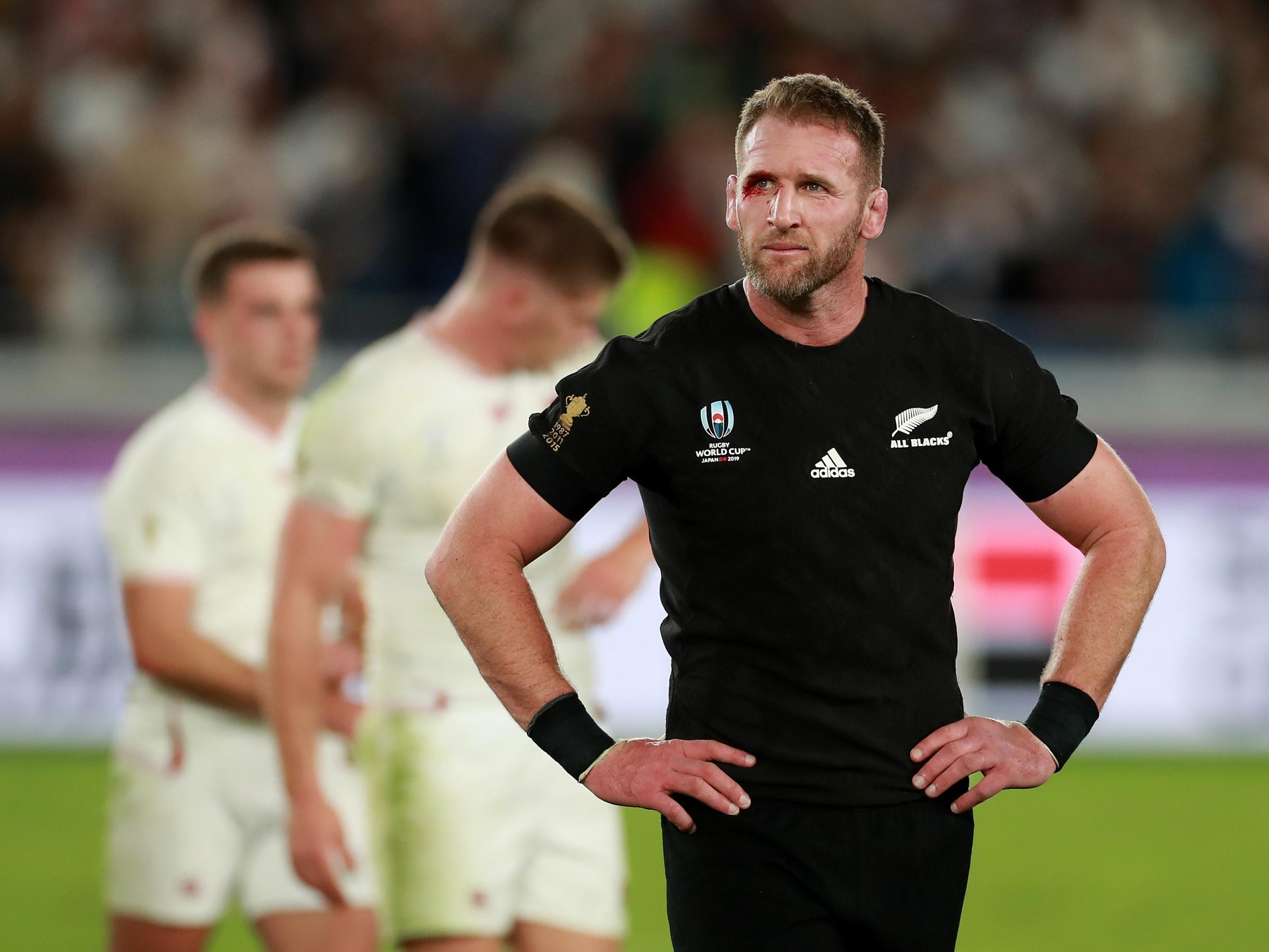England vs New Zealand: Why semi-final defeat confirmed the end of an era for the All Blacks
For all the soul-searching that is to follow this defeat, perhaps it’s time for New Zealand and their proud, expectant followers to accept the laws of life: that nothing lasts forever

Can we call it a dethronement? A changing of the guard, even? While it feels a stretch to suggest that the All Blacks’ stranglehold on the sport has finally been broken, there was no doubting the significance of Saturday’s semi-final. For England, it felt like confirmation of a bright new dawn, another upward step on the ladder. For those who left the pitch with their heads hanging low, bodies battered and bruised, it felt like the end of an era.
New Zealand have been the gold standard for the past 10 years. In the pantheon of greats, the All Blacks have stood proud and tall, the purest distillation of sporting supremacy. Under Steve Hansen, who took charge in 2012, the side has won 92 out of 105 Test matches – including Saturday’s 19-7 humbling. At the World Cup, there seemed to be no end to their dominance, having won a record 18 consecutive games following that quarter-final defeat way back in 2007.
In beating New Zealand then, England brought to a halt the flow of history. They turned off the taps, smiling as they did so. By the end of a dry and still evening in Yokohama, the sense of inevitability that surrounds the All Blacks – “Just give us the World Cup now,” the New Zealand Herald chirped before the tournament – had dissipated, replaced by the bewilderment and agony of those struggling to process what had happened.
But there was no denying the outcome. That was clear to both sets of players, fans and coaches. “I think they [England] were deserved winners tonight,” said Hansen afterwards. “You had two very good sides going at each other and the team that took the game won the game.” It was the same admission among his men. “They came out with a hiss and a roar, gave us a punch to the nose from the get-go,” said George Bridge.
Indeed, it was the nature of the defeat which said so much more than the actual result. Because New Zealand weren’t just beaten. They were outplayed, outsmarted, outmuscled. In every department of the game, the English, who could have put at least 15 more points past their opponents, were the superior side.
At the line-out, Brodie Retallick and Sam Whitelock were bullied into submission by the brilliance of Maro Itoje, a tour de force who can be rightly considered as one of the game’s very best. In the breakdown, Sam Underhill and Tom Curry terrorised New Zealand, drawing penalties and repeatedly forcing the turnover. “Anytime that we were sort of getting any assertiveness or ascendancy we’d get a penalty at the breakdown or we’d give away a silly penalty,” said Aaron Smith. “We just couldn’t get anything, eh?”
Then there was England’s defence, an impenetrable wall of white that didn’t given an inch. The menace and verve of New Zealand’s potent back line was nullified to the point of oblivion. Every hit on the All Blacks seemed to suck the life out of them, leaving Hansen’s players hollowed-out shells by the final whistle. The world champions simply couldn’t find a way through, whether that was up front in the heated, close exchanges or out wide on the flanks.
It was all just so atypical of New Zealand. They were made to look so normal, so plain, reduced to mere mortals by an English game plan that got everything right on the big occasion. But as the post-mortems are rolled out in the coming days, with Saturday’s performance dissected and scrutinised under the cold light, you sense that this hurting nation will want answers and not simple shrugs of the shoulders.
Because for a country like New Zealand, where rugby flows in the blood and waters, where the national identity is shaped by the sport, the suggestion that the All Blacks were merely ‘beaten by the better side’ might not cut it.
Questions will be asked of the side’s mental constitution – as was the case in the immediate aftermath of the defeat. Hansen was left smarting at the suggestion that his men lacked the necessary hunger. “If you want to spend some time outside I’ll give you a rugby education on that one,” he said in response to the reporter who had raised the point.
Was it the case that the All Blacks didn’t show the English the respect they deserved? Admittedly, few would have expected to see Manu Tuilagi diving over with just 90 seconds on the clock – but even after Ardie Savea’s own score 55 minutes later, there was an edge missing to New Zealand as they toiled in vain to overturn their opponents. The fightback so many of us expected never materialised.
Questions will be similarly asked of selection. Hansen held his hands up in admitting the decision to start Scott Barrett over Sam Cane, with the hope of dominating the line-out, backfired. But it goes even deeper than that. Since the summer the Richie Mo’unga-Beauden Barrett axis has been fixed under the spotlight, with fans, journalists and neutrals alike vacillating back and forth in their opinion over the tactic.

Against South Africa and Ireland it reaped rich rewards, but in the Rugby Championship defeat by Australia and here in Yokohama it failed to deliver. Mo’unga’s field kicking was limited on Saturday while Barrett’s speed and penetrative running were kept under wraps. Maybe the two-time world player of the year could have been the man to unpick the English defence, but from 15 he never had the chance to put his creativity and vision to the test. With Hansen stepping down as head coach next month, this could well be the end of the dual playmaker approach.
Many will also suggest that the writing has been on the wall for the past year now. Alongside the record loss against the Wallabies ahead of the World Cup, there was the 16-16 draw with South Africa on home turf. Nine months previously, the All Blacks had been squeezed out by a relentless Ireland side in Dublin, going down 16-9. Added to this was Hansen’s constant tinkering in the build-up to Japan which reinforced the perception, whether rightly or wrongly, that New Zealand weren’t settled heading into this tournament. They had lost their aura of invincibility, many said.
But for all the soul-searching that is to come, perhaps it’s time to accept the laws of life: that nothing lasts forever. History’s great dynasties can stand for years, decades, centuries even – but none can outrun the sands of time. All eventually fade. With Hansen and Kieran Read set to step down from international duties next month, and other veterans such as Sonny Bill Williams, Aaron Smith, Joe Moody and Sam Whitelock unlikely to feature in France 2023, perhaps this current iteration of the All Blacks has simply reached the end of the road.

Greatness is a hard thing to sustain, but for nearly a decade now New Zealand have done just that. But with the side past the peak of its powers, it should come as no surprise that a brighter, younger team, one bristling with unwavering belief and budding talent, has at last landed the killer blow when it matters most.
Even so, as the nation and its players retreat to lick their wounds, to reflect and contemplate this loss, we know New Zealand will be back. It may well be the end of an era, but from the ashes of defeat the All Blacks will no doubt rise once again, wiser, sharper and stronger than ever, ready to reclaim the throne.
Join our commenting forum
Join thought-provoking conversations, follow other Independent readers and see their replies
Comments